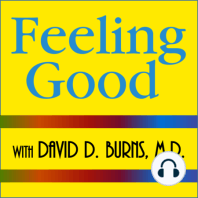84 min listen

170: Ask David: Helping Abused Women, and the Case Against Wellness!
170: Ask David: Helping Abused Women, and the Case Against Wellness!
ratings:
Length:
34 minutes
Released:
Dec 9, 2019
Format:
Podcast episode
Description
Today, Rhonda could not join us due to the religious holidays, so we have recorded several podcasts with my wonderful neighbor, Dave Fribush, as host. In addition, we are joined by Michael Simpson, a friend and colleague from New York. Dave, Michael and I answer two thought-provoking questions! 1. Working with Abused Women Hi David (and Rhonda!), I want to start out by stating how much I love your podcast. It has helped me understand myself, and, in turn, has made me a much more effective counselor. I'm a drug and alcohol counselor, working here in Los Angeles. I work primarily with women from 18 - 25 years old who have aged out of the foster care system. They are an endearing group of women, as I know you are aware (I've heard you speak of working with this population), and they just want to feel loved and worthy. However, their deep-seated beliefs of being unworthy of good things happening in their lives prevents them from attaining their goals of getting jobs, getting their children back, and gaining housing. These deep-seated beliefs are based on mistreatment by their families of origin, and their subsequent experiences in the social services system. Most were sexually abused or physically abused as children, taken out of their homes, then bounced around from one Foster Care family to the next. Despite my best efforts, the majority of these women go back out to the streets just shy of completing our 6- to 12-month treatment program. Once on the streets they return to drug dealing, prostitution, and crime. After which, if they are lucky, they get picked up and incarcerated. Many die on the streets of drug overdoses or murder. I'm using all of the tools I can to help them change their core beliefs, but it is challenging to say the least! My question to you is—is there a book coming out which goes into depth about T.E.A.M. therapy? I need to become the most effective counselor I can in order to help these women recover and lead normal lives. Thank you so much for your help! Keep up the good work. You are definitely saving lives!! Pennie Hi Pennie, Thank you so much for your question. I did work with this population at the Presbyterian / University of Pennsylvania Hospital in Philadelphia, and found the patients to be incredibly rewarding and hungry for help, love, and connection, as you have said. I’m sure it is heart-breaking for you to see so many fall short, continue to struggle, and even die on the streets. I found this population to be particularly easy and rewarding to work with because they seemed so grateful to be getting any kind of help at all. Many of our patients were homeless, and about a quarter of them could not read or write. We gave them more than eight hours of cognitive group therapy every day in a residential treatment setting, so they got 40 to 50 hours of therapy per week. The program was very inexpensive to run, and was more or less free to the participants, paid for by some type of medical assistance insurance, as well as by our hospital. Most patients showed dramatic changes within three or four days. The average length of stay was something like a week or ten days or so. In today's podcast, I describe a patient in one of our groups, a woman who was severely depressed. She thought of herself as "weak" and "a bad mother." She recovered from her depression in just 20 minutes or so when I used a TEAM-CBT method called "The Paradoxical Double Standard Technique. My book, Ten Days to Self-Esteem, is the program we used at my hospital in Philadelphia when working with this population. It is a simplified version of CBT, and it is a ten-step program that can be administered individually or in groups (which I prefer.) It is written using simple words for individuals with little education. We gave a copy to every patient entering our program, and found that really boosted our outcomes. The hospital purchased them in quantities of 50 or more, and got the wholesale price, which made the books cheaper than having
Released:
Dec 9, 2019
Format:
Podcast episode